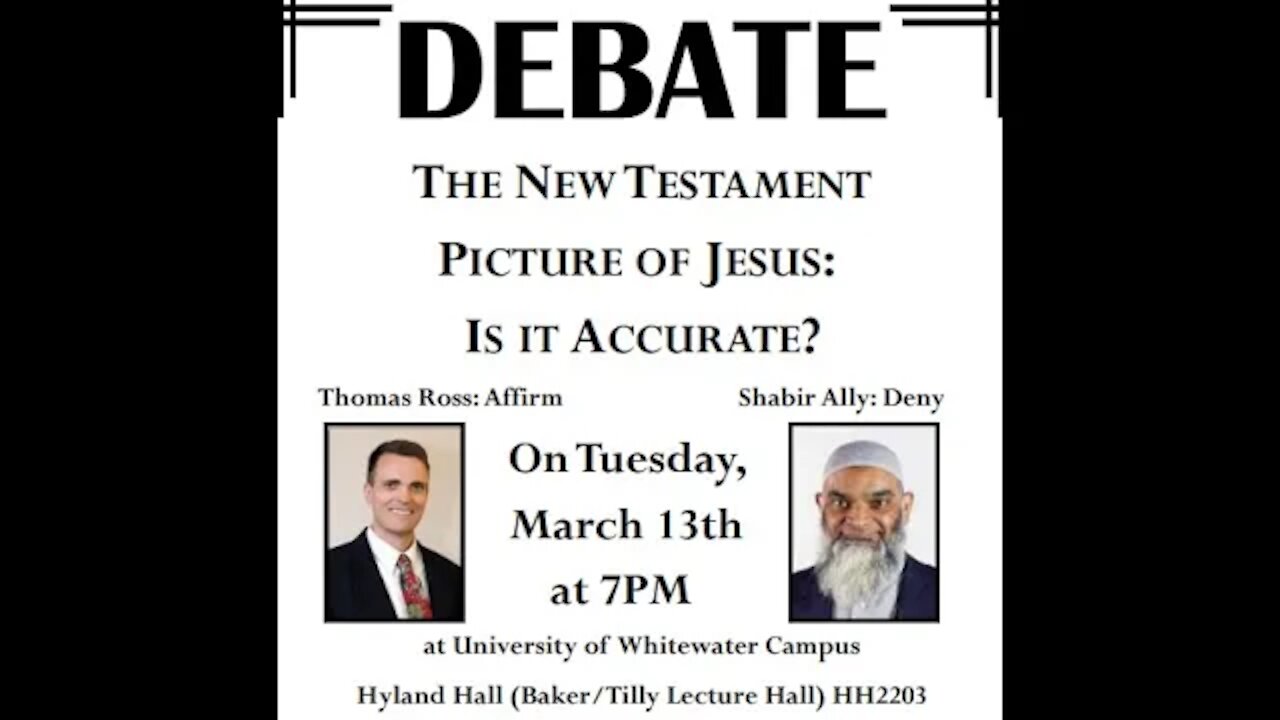Premium Only Content

Shabir Ally & Thomas Ross Debate Review: The New Testament Picture of Jesus: Is It Accurate?
A review of the Shabir Ally and Thomas Ross debate "The New Testament Picture of Jesus: Is it Accurate?" at the University of Wisconsin at Whitewater in 2018. Both the arguments of Thomas Ross and Shabir Ally are reviewed. The debate was over whether or not the extant facts of history support the New Testament presentation of Jesus Christ as evidenced by the historical Jesus’ self-understanding and proclamation and as understood and proclaimed by His eyewitnesses and earliest followers.
A special word for our Muslim friends watching this video:
Please consider the arguments in the video critically. You may be passionately convinced that Shabir Ally is right and Thomas Ross is wrong, but please do not let your passions govern your analysis of the arguments in question. Give the video a fair hearing and listen to it completely, and view its contents as a chance to understand why and how Christians think as they do, even if you disagree. If you want to comment on the video, that is great, but please interact intelligently with the content of the video. If you agree with something on it, say why and give a reasoned argument; if you disagree, say why and give a reasoned argument. Thank you in advance for your thoughtful consideration.
Christian, atheist, agnostic, Hindu, Buddhist, etc. friends who watch this video are likewise urged to engage in respectful and reasoned consideration of the video contents.
Summarizing the content of the video, Thomas Ross's argument was:
1.) The New Testament was composed by eyewitnesses to Christ and His earliest followers.
2.) The NT was too early for there to be a transformation from the Muslim “Jesus” to the Biblical Jesus, the Jesus of history.
3.) Many, many facts of history supported points #1 and #2 above. In fact, the ancient evidence is overwhelming in favor of the Christian picture of Jesus Christ while no ancient evidence supports the Muslim picture of Jesus Christ.
Thomas Ross's statements about extremely early evidence from pre-Pauline sources such as 1 Corinthians 15 and Philippians 2, the unanimous historical support for the Gospels' traditional authorship, the evidence for early dates (Matthew: c. A. D. 40; Mark c. A. D. 43; Luke c. A. D. 48; and John c. A. D. 50-65) are reviewed.
Shabir Ally's arguments were also examined in detail.
Dr. Ally claimed that the Quran (Koran) sometimes says very good things about the Bible but then also critiques it, citing Surah 2:75-79. He also claimed mathematical miracles proved the Quran was the Word of Allah. Shabir cited alleged Biblical contradictions and claimed that the consensus of historical-critical scholars shows that the Christian position is false. The Christian Jesus evolved from the historical Jesus, who was a Muslim prophet, through "Q," to Mark, to Matthew and Luke, to John, where Christ had evolved into a semi-divine being. After the New Testament era the evolution progressed to make Christ into God and part of the Trinity. Furthermore, the Apostle John did not write the Gospel of John because the term "beloved disciple" is used only in John, only John's Gospel refers to Christ as the "Word of God" or "Logos of God"; John's Gospel changes Christ's words; the prologue and epilogue of John were added by a "Johannine community." Even in John Christ is not called "the God" but is only a divine or quasi-divine being. The Gospels are inaccurate because they had a theological agenda. The strength of theological liberalism / modernism and historical-critical arguments are evident from the fact that conservative scholars become liberal or atheists, but liberal scholars do not become conservative.
Furthermore, Shabir Ally argued that all early Christian sources were simply copying from Papias, who did not have accurate information; no first century evidence exists for the traditional authorship of the Gospels and the Gospels themselves are late and anonymous compositions. The Gospel record that Christ called the mustard seed the smallest seed is an error, as is the reference to Abiathar the high priest (Mark 2) and the record of Christ's cursing the fig tree (Mark 11).
All of the arguments above by Shabir Ally are carefully examined and refuted.
The video concludes by pointing out the astonishing evidence for liberal and secular censorship of conservative scholarship as evidenced in the experiences of numbers of scholars and as seen in the gaps in Shabir Ally's own knowledge during the debate.
More information, including a written review of the debate, careful reviews of the alleged Biblical contradictions Shabir Ally set forth from Matthew's genealogies, Paul's conversion, Luke and Acts, and the resurrection narratives in the Gospels, is available at:
-
 2:37:42
2:37:42
FreshandFit
8 hours agoGreg Doucette Guessed Their Body Fat Percentages And THIS Happened...
66.9K67 -
 5:08:30
5:08:30
Akademiks
8 hours agoKendrick Lamar SPEAKS for first time SINCE BEEF in new Interview. Drake preppin new album. YE WYLING
81.2K16 -
 2:12:17
2:12:17
Tucker Carlson
8 hours agoMike Benz Takes Us Down the USAID Rabbit Hole (It’s Worse Than You Think)
168K385 -
 1:47:17
1:47:17
Roseanne Barr
12 hours ago $27.16 earnedThe Most Offensive Comic, Leonarda Jonie | The Roseanne Barr Podcast #86
103K104 -
 4:17:42
4:17:42
Joker Effect
9 hours agoRumble Community Night. Reviewing Rumble partnership program, it's streamers and community discussion.
68.2K14 -
 2:29:56
2:29:56
Laura Loomer
10 hours agoEP100: MAGA Goes Scorched Earth On USAID
66.2K48 -
 51:45
51:45
Talk Nerdy 2 Us
11 hours ago🔥 Talk Nerdy 2 Us – Feb 7th: HACKED, TRACKED & UNDER ATTACK! 🔥
74.1K6 -
 58:33
58:33
Man in America
17 hours agoFluoride & the Sinister Plot to Poison Us From Birth w/ Larry Oberheu
66K21 -
 3:41:30
3:41:30
I_Came_With_Fire_Podcast
18 hours ago🔥USAID SCANDAL | MA-GAZA | Cartel VIOLENCE Ramps Up🔥
66.6K10 -
 7:57:34
7:57:34
SpartakusLIVE
12 hours agoShadow BANNED, but we PARTY ON || Friday Night HYPE
70.1K2